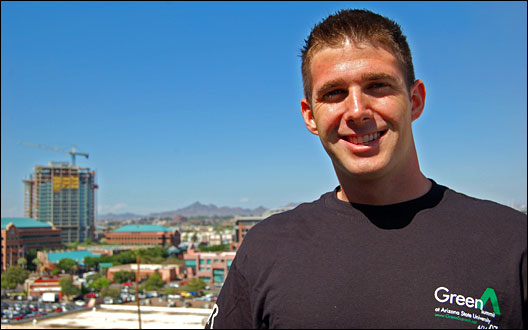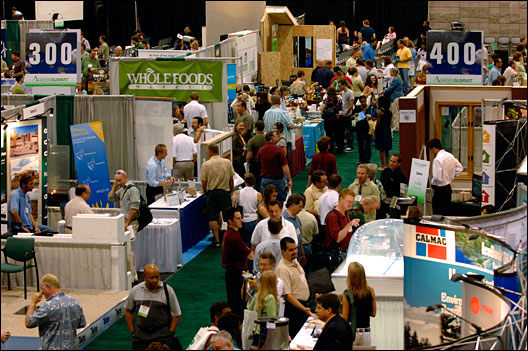
Age: 23
School: Arizona State University
Sometimes people do things because they don’t realize they can’t. If this makes no sense to you, you haven’t met Chris Samila, a (permanent, as he jokingly puts it) senior at Arizona State University in Tempe, where he had some epiphanies, founded a business (Green Summit Inc.), and somehow managed to pull off a wildly successful green business expo on campus. With no experience. And no real cash. And about five volunteers.
“We had no idea what we were doing,” Samila says. “There were so many nights where I was like, ‘Oh my god, what do we do now?'”
What they did, it turns out, was bring together several thousand students, locals, and business owners for a one-day showcase of green products and services spilling out from under a rented tent on campus. The April 2007 event was so successful, Samila signed on to coordinate another GreenSummit in 2008 — this time a two-day affair at the Phoenix Convention Center — to again bring consumers, educators, and eco-friendly businesses under one roof. The summit, which took place on Sept. 5 and 6 with support from ASU and its Global Institute of Sustainability, drew 5,000-plus people, including a U.S. Commerce Department-sponsored delegation from Eastern Europe. Next year the GreenSummit will expand to Atlanta.
We caught up with Samila shortly before this year’s expo began, on a day when he’d been racing around campus putting staticky film (an eco-friendly, no-residue variety) on windows to advertise the event.
Why window stickers?
We’re trying to do as much as possible without using paper. So we’ve mostly been trying to get the word out through social networks to avoid things like flyers and mass mailings. With the summit itself, we really pushed the exhibitors hard to create digital profiles. We didn’t want them putting out a billion promotional packets.
How did all this environmental commitment start in your life?
The first six months at ASU, I lived in the most insane party complex you can imagine. It was like Animal House. So after about six months I said, “Okay, enough,” and started going to the library. And one day I picked up a book called Ocean’s End, about the Black Sea and the environmental destruction of the oceans — how there was no return. And all of the sudden it occurred to me: We’re messing something up and we can’t fix it. It’s too late. And I decided I wanted to be able to fix things now, before it’s too late. When the ASU School of Global Studies opened in the spring of 2006, I was one of the first to enroll.
Where did the business angle come in?
In the fall of 2006, I read about Greenbuild [a green-building conference and expo] and I thought, “I gotta go to this.” The school actually funded my trip to the conference in Denver, and I was just awestruck by the amount of innovations there. The message was, building green isn’t too expensive or difficult. There are no insurmountable issues. The biggest issue is that we need to get everyone to realize these are issues in the first place.
But the real epiphany involved compact fluorescent light bulbs, right?
It happened in winter break, after Greenbuild. My friend Lance and I took a trip to Costa Rica and we were going though the jungle, and there were all these CFLs in these jungle huts. And we were like, “Whoa.” This was a really remote area and I thought, “If Costa Ricans can use CFLs in huts in the jungle, we can get people to use them in America.” I decided I wanted to do an event on campus that showcases CFLs and shows who’s using green products that can make a difference.
How did you know what to do next?
I pretty much googled “event management” and got some students together to contact and invite companies. We’d be working till 11:00 and 12:00 at night, in between classes making phone calls and trying to get this thing going. And later I called my stepdad, who has a marketing company in Atlanta, and we borrowed someone from his staff to make a website that looked legitimate. Luckily the Global Institute of Sustainability started helping us. God almighty, it was stressful.
Any advice for fellow college students?
All of these industries realize they have to think outside the box to solve problems, and a lot of them want students to help — they want to connect with them. Sometimes you can talk to a company and they’ll say, “Get lost.” But you’ve got to just keep pushing, keep trying, and don’t get pissed off. Join the AIA [American Institute of Architects]; join trade groups. There is this initial disconnect between the business world and students, but businesses really admire how we can multi-task — emails, text messaging, phone calls, Facebook, AOL, all going at the same time. If you can take that and take your caring about the environment and put that in the business world, it’ll make a tremendous difference.



